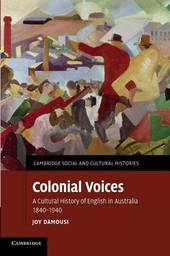
|
Colonial Voices: A Cultural History of English in Australia, 1840-1940
Paperback / softback
Main Details
| Title |
Colonial Voices: A Cultural History of English in Australia, 1840-1940
|
| Authors and Contributors |
By (author) Joy Damousi
|
| Series | Cambridge Social and Cultural Histories |
|---|
| Physical Properties |
| Format:Paperback / softback | | Pages:326 | | Dimensions(mm): Height 229,Width 152 |
|
| Category/Genre | Sociolinguistics
Australia, New Zealand & Pacific history |
|---|
| ISBN/Barcode |
9781107673373
|
| Classifications | Dewey:427.994 |
|---|
| Audience | | Professional & Vocational | |
|---|
| Illustrations |
21 Halftones, unspecified
|
|
Publishing Details |
| Publisher |
Cambridge University Press
|
| Imprint |
Cambridge University Press
|
| Publication Date |
23 January 2014 |
| Publication Country |
United Kingdom
|
Description
Colonial Voices explores the role of language in the greater 'civilising' project of the British Empire through the dissemination and reception of, and challenge to, British English in Australia during the period from the 1840s to the 1940s. This was a period in which the art of oratory, eloquence and elocution was of great importance in the empire and Joy Damousi offers an innovative study of the relationship between language and empire. She shows the ways in which this relationship moved from dependency to independence and how, during that transition, definitions of the meaning and place of oratory, eloquence and elocution shifted. Her findings reveal the central role of voice and pronunciation in informing and defining both individual and collective identity, as well as wider cultural views of class, race, nation and gender. The result is a pioneering contribution to cultural history and the history of English within the British Empire.
Author Biography
Professor Joy Damousi is Head of the School of Historical Studies, University of Melbourne. Her previous publications include Depraved and Disorderly: Female Convicts, Sexuality and Gender in Colonial Australia (1990), The Labour of Loss: Mourning, Memory and Wartime Bereavement in Australia (1999), Living with the Aftermath: Trauma, Nostalgia and Grief in Post-War Australia (2001) and Freud in the Antipodes: A Cultural History of Psychoanalysis in Australia (2005; Winner of the 2006 Ernest Scott Prize).
Reviews'In this book Joy Damousi shows that imagination has ears. She sketches a great ant-nest of sound, the sound of Australian voices in the past, and shows how they were regulated and reformed, restricted and empowered. This is a path-breaking book, brilliantly researched and beautifully written. Joy Damousi shows that the Australian sense of self is much more complicated than we ever thought. Shifting ideas about speech, and about the right way to speak, have been crucial to the question of national belonging, more subtle than skin colour but maybe just as powerful.' Alan Atkinson, University of Sydney and author of The Europeans in Australia 'One of Australia's most distinguished historians, Joy Damousi has now turned her attention to language and speech. This wide-ranging book captures insights into aspects of Australian history from colonial race relations to elocution and public oratory; education, class and gender; and questions of accent surrounding the advent of radio and 'the talkies'. The result is a rich and fascinating account that shows how sound is at the very core of culture and history.' Angela Woollacott, Australian National University and author of Gender and Empire 'A lively and engaging overview, probing the ways in which images and ideologies of language - particularly in terms of speech and voice - can variously be deployed (and redeployed) in the contexts of Australian English and its own historical trajectories. Joy Damousi makes use of a range of innovative primary material, to explore some of the colonial legacies of language attitudes which have their political and socio-cultural origins in the heyday of Empire.' Lynda C. Mugglestone, University of Oxford and author of Talking Proper: The Rise of Accent as Social Symbol '... a highly original study of the relationship between language and empire and the centrality of voice and pronunciation in defining individual and collective identity.' The Historical Association (history.org.uk)
|